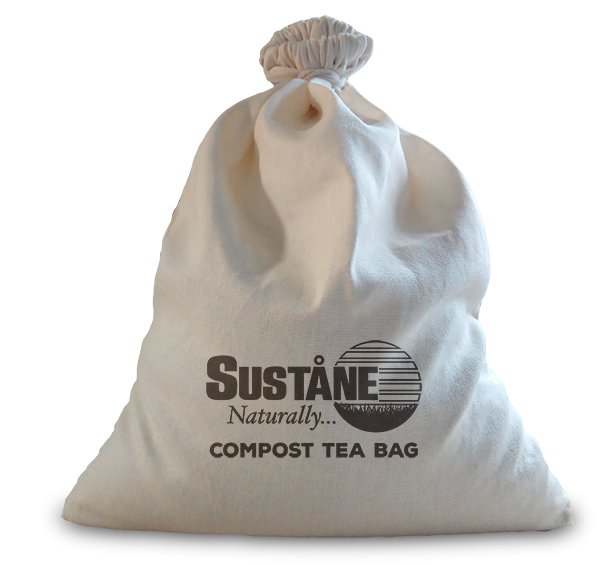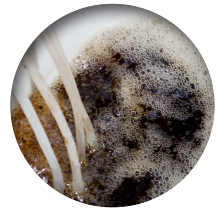
Suståne compost tea is designed to deliver humic substances that can act as biostimulants and active microorganisms that can contribute to nutrient cycling and the ecology of healthy soil.
What is Compost Tea?
Compost tea is the result of adding high-quality compost that is rich in beneficial micro-organisms to water with the presence of oxygen and allows it to “brew”. When these microbes are provided with water, oxygen, and a food source the start to multiply rapidly, populating the “tea” with billions of beneficial microbes. Suståne 4-6-4 provides all the essential components of effective compost teas and has been proven to support improved plant growth.
Microbiology from aerobic compost provides numerous benefits to plants and soil. Beneficial micro-organisms compete for resources with the disease-causing bacteria (pathogens) resulting in less disease pressure and healthier plants.
The microbes also go to work converting the nutrients from the compost to water-soluble, plant-available form. This process makes the organic nutrients more readily available and easier for plants to take up. Soluble nutrients result in a faster response from the plant. Some composts are very rich in nutrients resulting in a tea that works as a fertilizer as well as a soil enhancer. Other composts have very little nutrients and do not provide enough plant food alone.
Making high-quality compost tea can be difficult as composts tend to vary significantly in quality. Poorly made compost may contain minimal beneficial micro-organisms and could potentially carry harmful pathogens that could multiply when the compost tea is brewed. Low numbers of microbial populations or the presence of harmful pathogens are often the result of “compost” that was made without oxygen present (anaerobic) or did not have the proper ratio of carbon to nitrogen (C:N) to reach a temperature sufficient to kill harmful pathogens.
How Compost Tea is Used:
At the end of the brewing cycle, the water is teeming with beneficial micro-organisms and plant-available nutrients. This water can be sprayed over the plant leaves and roots and used to drench the soil. Plants treated with compost tea will generally look fuller, brighter, and with less disease pressure. Make an enriched compost tea for superior results. Once brewed, it blends well with Suståne’s Hi-N 12-0-1 WDF to make an enriched compost tea with superior characteristics!
Suståne 4-6-4 Compost Tea Bags are prepackaged permeable fertilizer packs that are left to steep in containers with water to make a Compost Tea brew for topical application.
Suståne 4-6-4 Compost Tea bags come in two sizes, single-use 21-gram size for watering cans, or to be used as Root Zone Feeder Packs and reusable organic cotton bag 5 lb compost tea bags, which each make 50-100 gallons.
There are multiple benefits to using compost teas. More than supplementary nutrients, composts teas deliver humic substances that can act as biostimulants and active microorganisms that can contribute to nutrient cycling and the ecology of healthy soil.
Using compost teas may reduce the need to apply pesticides. Many reports indicate that compost teas increase plant tolerance to biotic and abiotic stresses, reducing the need for other inputs.
- Increases the nutrient and water holding capacity of the soil
- Strengthens plants tolerance against hot dry conditions
- Promotes greater root development
- Improves buffering against changes in soil pH
- Increases the soil’s ability to suppress plant pathogens
- Increases soil porosity and stability for greater root development and water holding capacity
How to Make High-Quality Compost Tea:
Compost Tea is simple to prepare. Add two 21 gram tea bags per gallon (42 grams), or a 5 lb. Compost Tea Bag per 50-100 gallons (190-380 L) of water, aerate and steep for 24 to 48 hours at 60°- 85° F (10° - 25° C).
Aeration during the brewing process increases the level of active microorganisms in the Compost Tea
Apply to plant leaves and roots. Apply the normal amount of water as you would when watering the plant.
- Use Compost Tea Brew within 36 hours of placing the teabag in the water. The brew will become anaerobic once the microbes have consumed all of the oxygen in the water.
- Use Compost Tea before plants begin to set fruit. Do not spray Compost Tea brew directly onto existing fruits and vegetables.
- After all of the Compost Tea is used, the remaining pouch or compost inside the reusable 5 lb. Compost Teabag may be placed in the garden or on/in the soil to continue to benefit from the compost fertilizer or place the used Compost Tea pouch into an existing compost pile to jump-start the composting process.
Always Safe for Plants, People and the Environment
- Manufactured by Suståne in the USA at an EPA permitted facility.
- Pathogen and weed-free, no sewage sludge, blood or meat products. Contains no pharmaceutical waste or byproducts.
- Allowed for export to over 65 countries worldwide.
- Aerobic composting eliminates animal and rodent attraction to the application site.
- Contains naturally occurring beneficial bacteria and fungi that are necessary to begin nutrient life cycle in poor soil.
- Suståne is fully composted eliminating the need for sterilization, permitting a healthy environment for beneficial microbial populations.
Features of Suståne Compost Tea Bags:
- Assures High-Quality Compost - No need to make your own!
- Easy and safe to use.
- Made from Suståne nutrient-dense compost-based fertilizer
- Plant available organic nutrients. See the fast plant response!
- 21-gram permeable biodegradable paper filter packets OR 5 lb. reuseable organic cotton bag.
- No measuring, no special equipment, no waste.
Also contains non-plant food ingredients:
Contains 50,000 Colony Forming Units (CFU’s) per gram of the following species:
Bacillus amyloliquefaciens.........................................10,000 CFU’s per gram
Bacillus subtilis..........................................................10,000 CFU’s per gram
Bacillus pumilus.........................................................10,000 CFU’s per gram
Bacillus licheniformis.................................................10,000 CFU’s per gram
Bacillus megaterium................................................. 10,000 CFU’s per gram
For more information on Sustane fertigation products, view or download the Suståne Fertigation Brochure PDF.
View or download the Suståne 4-6-4 Compost Tea Bag and Root Zone Feeder Pack Specification Sheet PDF
Guaranteed Analysis
| Total Nitrogen (N) | 4% |
| 0.4% Ammoniacal Nitrogen | |
| 0.4% Other Water Soluble Nitrogen | |
| 3.2% Water Insoluble Nitrogen* | |
| Available Phosphate (P2O5) | 6% |
| Soluble Potash (K2O) | 4% |
| Calcium (Ca) | 4% |
Derived from aerobically composted turkey litter and feather meal
*3.2% slowly available nitrogen from aerobically composted turkey litter and feather meal.


